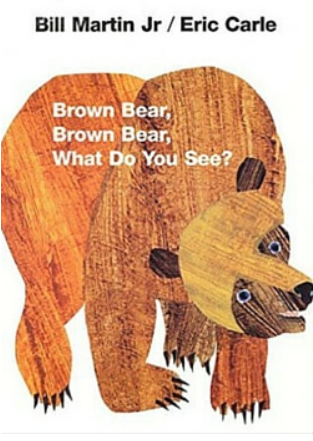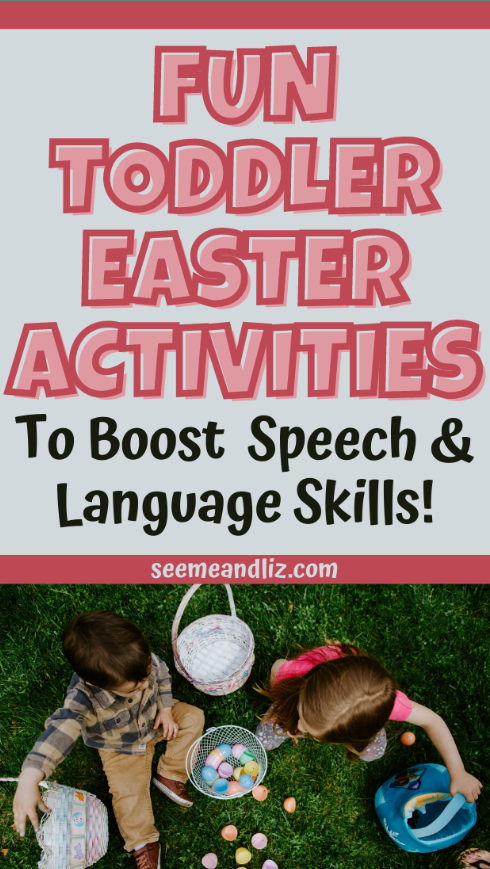Speech therapy activities for toddlers can and should be done at home on a daily basis if your little one isn’t using any words to communicate.
I want to start out by saying that I have used the term “speech therapy” to encompass both speech (sound production) and language (actual words used and how they are put together to form sentences).
However, most “speech” activities for toddlers (12 to 36 month old’s) should focus more on language development because getting your child communicating through gestures, sounds and words is more important than how clearly they are saying those words.
Accurate production of sounds typically isn’t a focus for most speech pathologists until a child is over the age of 3 as sound errors are to be expected prior to this age (and some continue to exist after 3).
The reason I have chosen the term “speech therapy activities” is because that is the phrase most people use when they are looking for activities for a child with a speech and/or language delay.
Now that we have sorted out the terminology let’s get started with some simple things you can do at home to help your toddler start talking!
Speech Therapy Activities For Toddlers
Turn Off The TV
While this is not an activity per say, it needs to be addressed.
When the TV is on in the background there is less face to face talking going on.
And we all know that children are mesmerized by the TV.
Even if you are talking to your child, they probably aren’t listening the same way they would be if the TV was not turned off.
Try to make it a habit to not have the TV on in the background (even if it is a kids “educational” show).
Research suggests that children learn best from human interaction, not by listening to conversations on TV.
Once a child is older (3+) and is speaking in sentences, asking and answering questions, retelling short stories, etc. then they may learn a few new words from a TV show.
Read Together
Now that you have turned the TV off, let your toddler pick a few books to look at together.

Keep them simple. Talk about the pictures you see. Point to the different items on each page. You don’t always have to read the words on the page. Make up your own story.
The point here is not to teach your toddler to read though, so make sure to keep that in mind.
If the book is a repetitive line book such as “Brown Bear, Brown Bear” and you have read it together several times, pause at the end of sentences that are repeated throughout the book and see if your child will fill in the missing word (don’t worry if it’s not pronounced clearly).
For example, “Brown Bear Brown Bear what do you see? I see a blue horse looking at ________.” The missing word in this case is “me”.
Alternatively, you could also omit the word “see” in the first sentence and wait for your child to fill it in.
If they aren’t using a word to fill in the blank encourage them to gesture by pointing to his eyes for “see” or pointing to himself for “me”.
Take a look at these wonderful books that are perfect for expanding your little one’s vocabulary!
This brings us to my next activity.
Use Gestures/Signs
Gesture use always precedes spoken language. Humans are naturally prone to using gestures to communicate. It helps us get our point across.
Children typically begin using gestures around 8–9 months of age.
If your child is not talking make sure that they are using gestures to communicate.
You can encourage the use of gestures by pointing to objects you are talking about and gesturing more yourself.
For example, if you say to your child “do you need a hug?”, wrap your arms around yourself to indicate a hug while saying the word “hug”.
Or if you and your child are going to blow bubbles, let them know by saying “let’s blow some bubbles” and then exaggeratedly blow air out your mouth, even moving your head from side to side while blowing.
Some parents find learning a few signs can be helpful.
And don’t worry, teaching your baby or toddler to sign will not cause a speech delay, in fact the opposite should occur if you make sure to always pair the spoken word with the sign!
It’s pretty easy to get started with baby sign language.
Sing Songs
Children can learn many words through songs and nursery rhymes.
Don’t worry if you don’t have a great singing voice, your child won’t care.
Some classic songs that most parents know and all children love are:
- Twinkle Twinkle Little Star
- Row, Row, Row Your Boat
- Old MacDonald Had a Farm
- The Itsy Bitsy Spider
- Mary Had a Little Lamb
Incorporate actions and gestures into these songs whenever possible!
As your child becomes more familiar with the songs you sing together, start leaving out repeating words here and there (just like with books).
Pause and wait to see if your child will fill in the missing word.
Repeat and Expand
This can be done with any activity or toy.
Whenever your child says a word, or uses a gesture/sign, repeat and expand. It’s quite simple.
If, for example, your toddler raises arms up while whining “uh uh uh”, you know that they most likely want to be picked up.
Rather than simply picking your child up, try saying “Up, you want me to pick you up” or something like that.
If you are having a pretend tea party and your child hands you a cup and says “drink”, you could respond with “mmm, drink, I’m drinking juice”.
The key to repeating and expanding is to try and keep the expansion as grammatically correct as possible.
This is not always easy to do but as long as you are aware of this, you should be fine.
Play Outside
The outdoors are full of language learning opportunities. New words are all around!
Talk about the animals you see. Look at the big trees or the small flowers.
Play in the sand! Watch your child dig, scoop and dump. Talk about what they are doing as they play. But make sure to leave lots of pauses to see if they will initiate communication with you!
An outdoor playset makes a great addition to a backyard.
There are many ways that language skills can be targeted while your child is playing at a playhouse for example.
Because there are so many opportunities for language development I have written an entire article about it. You can read it here.
A water table is another awesome outdoor toy that can be used to work on language skills.
Talk to your child about how the water feels, for example, cold, warm, and wet.
If you want more information about language skills and water play check out: The Language Benefits Of Water Play With Preschoolers!




